Six decades of Grammy Awards: And the hits and misses of the music academy
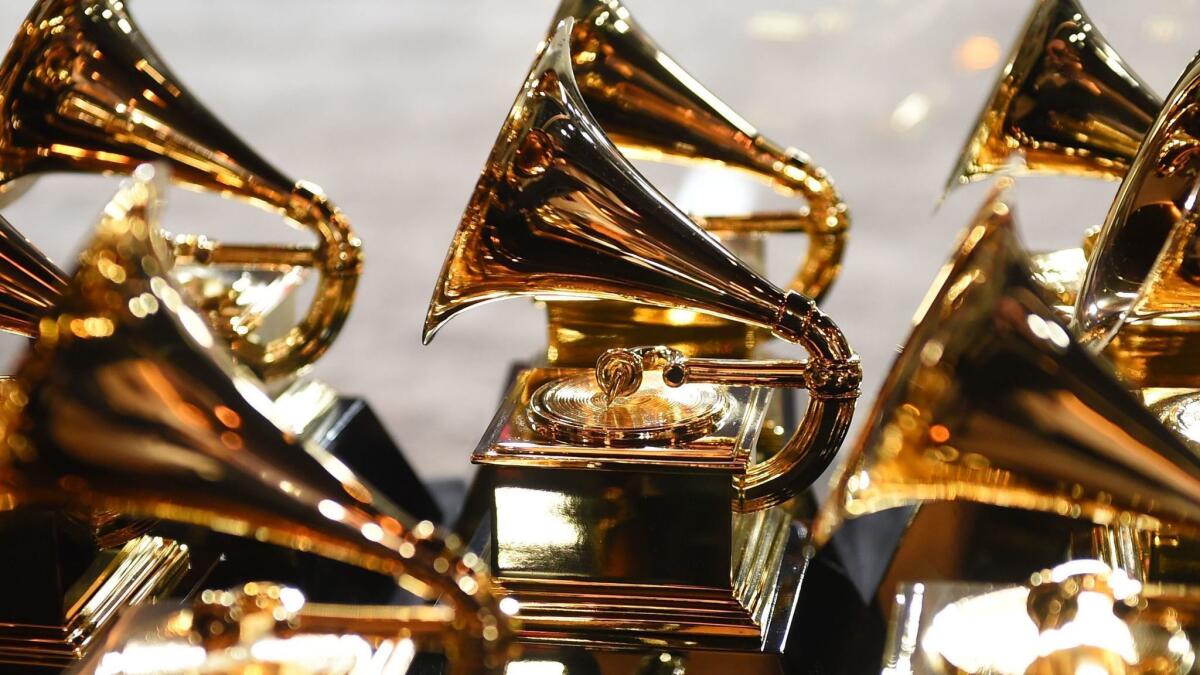
- Share via
In 1959, a few years after executives from the five dominant record labels met at the Brown Derby to discuss an Oscars-like celebration of contemporary recordings, the first Grammy Awards took place at concurrent black-tie events in Los Angeles and New York.
In the intervening six decades, the annual honors have become a cultural barometer that reveals generational chasms, technological innovations, cultural norms. Below are some notable moments, victories and defeats from past end-of-the-decade ceremonies.
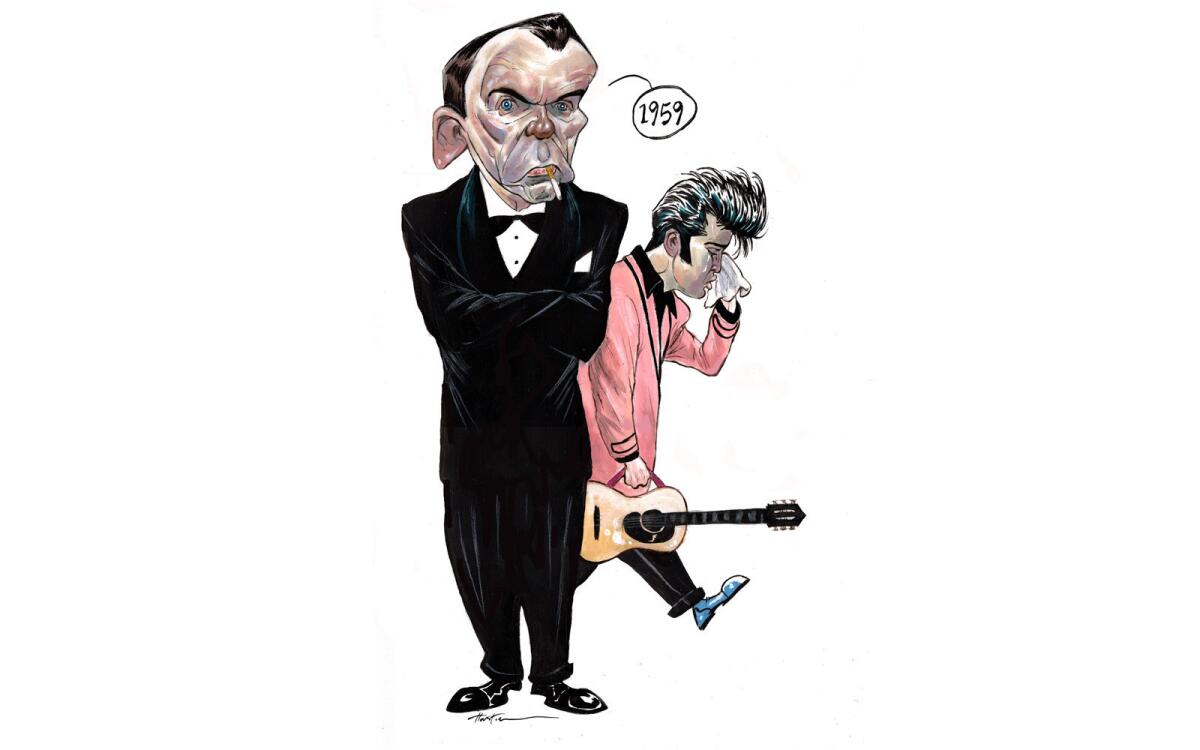
1959
The first ceremony, which honored recordings released in ’58, was notable for the night’s big loser: Frank Sinatra. Then near the peak of his success, he landed a dozen nominations and was expected to win big. But at the 500-capacity Grand Ballroom at the Beverly Hilton, Sinatra lost 11 times. Adding insult to injury, his sole win was for a non-musical category, best album cover.
That the album of the year went to Henry Mancini, for his soundtrack to the TV series “Peter Gunn,” and not to either of Sinatra’s two contenders, “Come Fly With Me” and “Only the Lonely,” likely rankled the crooner as well.
The awards debut revealed that the Recording Academy was already woefully out of touch. Rock ’n’ roll, at the time the dominant genre among teens, was completely ignored: No Elvis Presley, Little Richard, Fats Domino or even Roy Orbison. Indicative of the first year’s approach, session band the Champs were the victors in the R&B performance — for the novelty song “Tequila.”
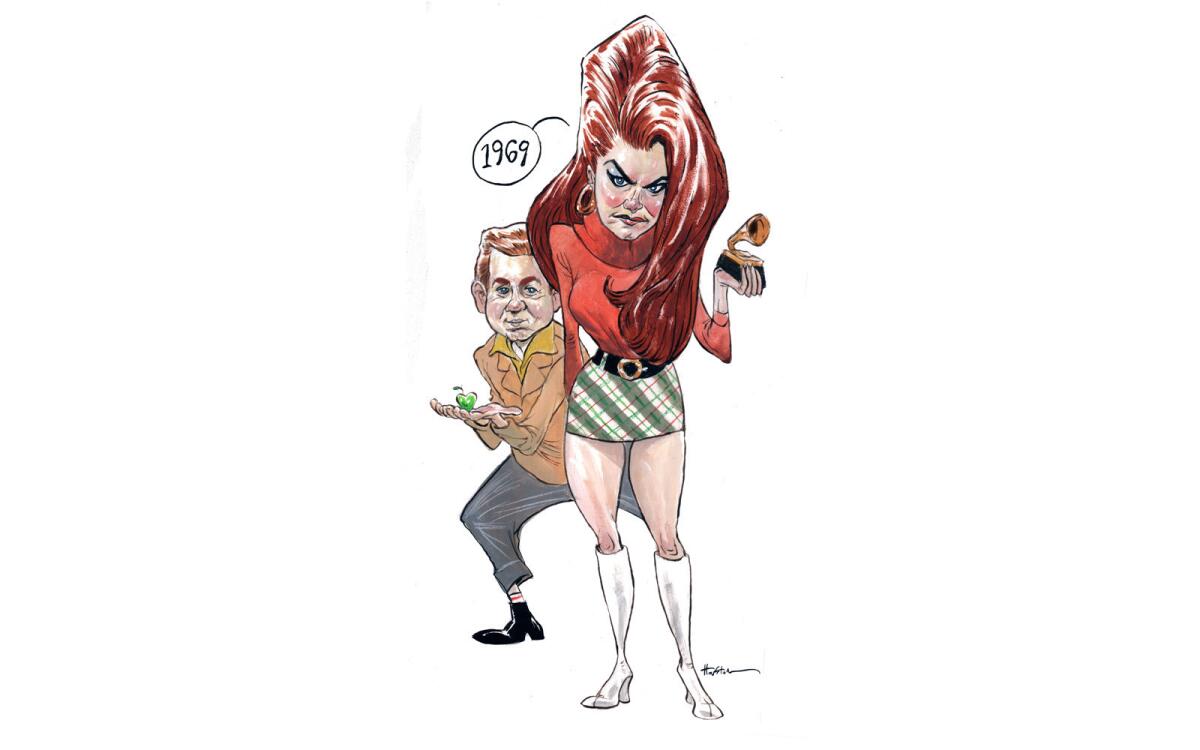
1969
While promoters of the Woodstock festival were prepping for their landmark August concert, Grammy voters were focused on less hallucinatory matters. The Grammy-winning song of the year was Bobby Russell’s “Little Green Apples,” about marital bliss and the titular fruit.
In the case of the best record, Simon & Garfunkel’s “Mrs. Robinson,” the subject was an autumn-spring romance. The album of the year? Glen Campbell’s “By the Time I Get to Phoenix” — the first country album to earn the top award.
By ’69, the voters had figured out what R&B was: Otis Redding earned a posthumous Grammy for “(Sittin’ on the) Dock of the Bay.” Also in the running for best record and song that year: Jeannie C. Riley’s feminist country anthem, Tom T. Hall-penned “Harper Valley P.T.A.”
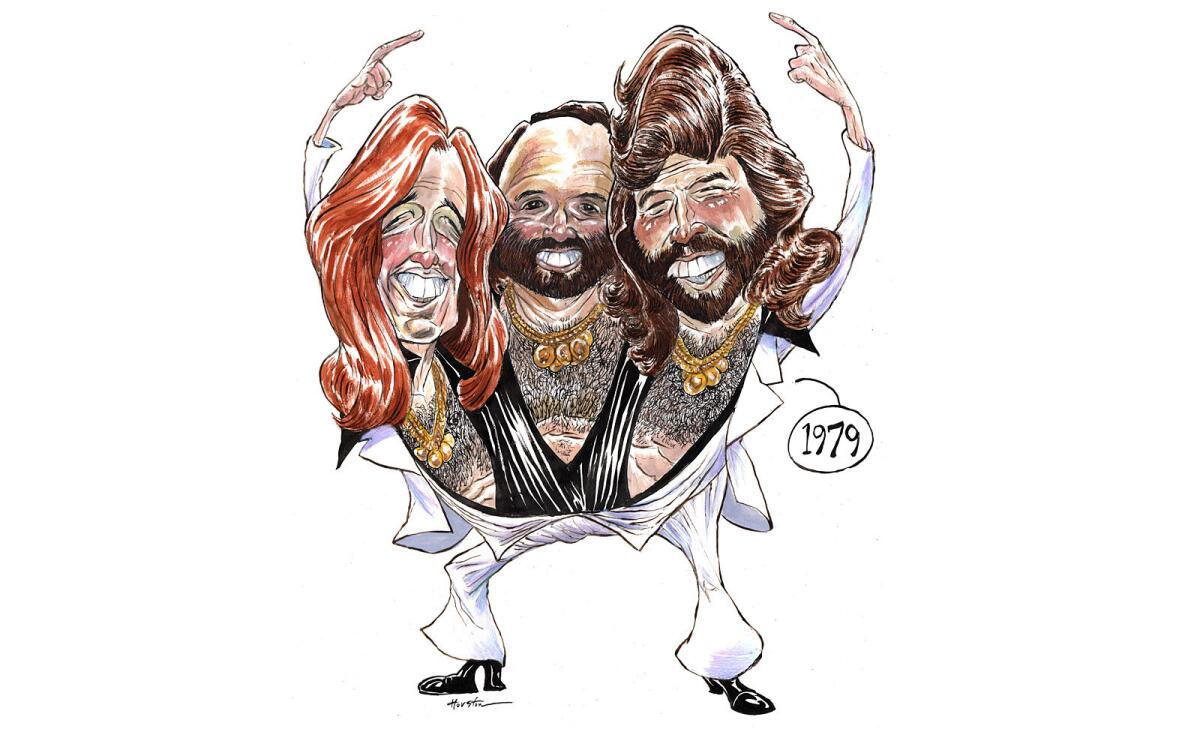
1979
Disco ruled the charts during the 21st awards ceremony, proof being that the soundtrack to “Saturday Night Fever” — and performers including the Bee-Gees, Yvonne Elliman, the Trammps and Kool & the Gang — won for its era-defining dance songs.
The year also marked the arrival of a piano-playing kid from New York: Billy Joel won his first two trophies for work from his album “The Stranger.” His treacly “Just the Way You Are” carried both the song and record of the year — besting hits by Lionel Richie, Anne Murray, Gerry Rafferty and others.
Steve Martin earned a second straight comedy Grammy for his platinum album, “A Wild and Crazy Guy,” a follow-up to “Let’s Get Small.” The ballot also marked the first acknowledgement of the punk rock movement, when a bespectacled British squirt named Elvis Costello earned a nomination in the new artist category.
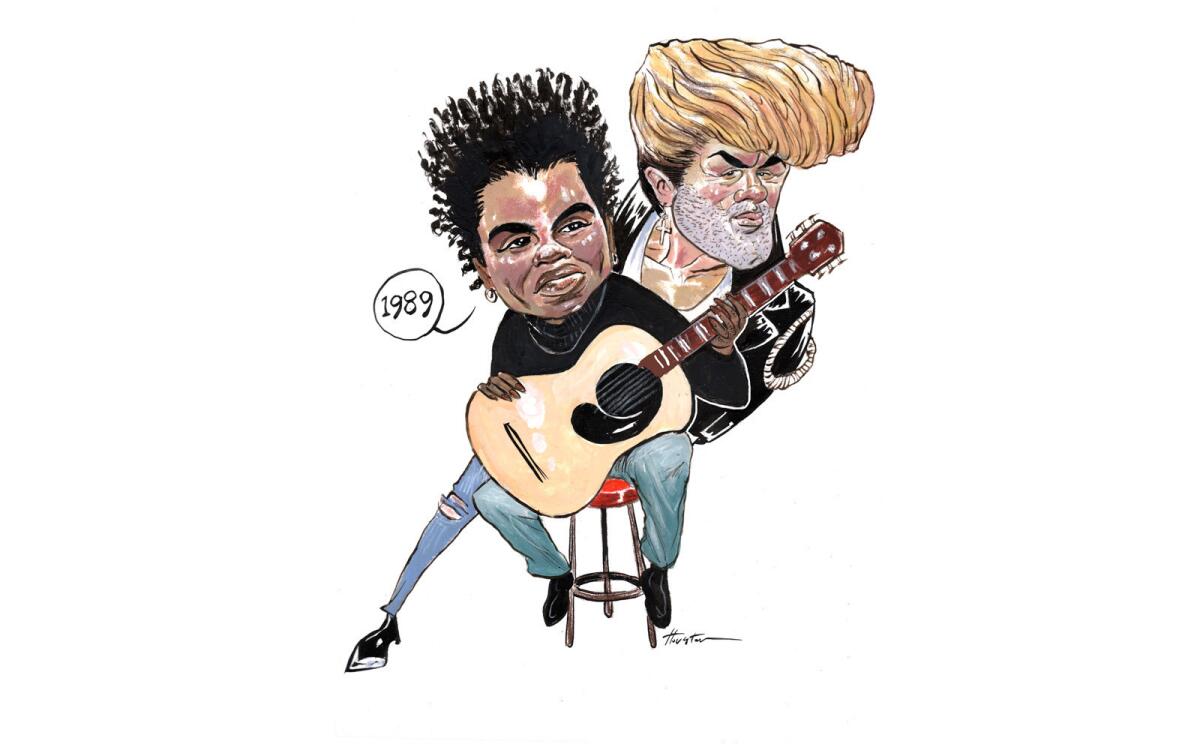
1989
Tracy Chapman, these days best known to the under-30 set for her recent lawsuit against alleged sample-stealer Nicki Minaj, upended the ’89 awards with her folk-inspired, very un-disco debut album.
Despite winning three awards including best new artist, though, her bracing but hopeful musical portraits were outshined by a capella vocalist Bobby McFerrin’s ode to obliviousness, “Don’t Worry, Be Happy.” By night’s end, both Chapman and McFerrin were outpaced in the album of the year category by “Faith,” George Michael’s smash soul-pop album.
From a history perspective, the year was notable for the addition of categories for two budding youth-oriented genres, rap and heavy metal. It also revealed how uninformed many voters were about new music. Victor in the metal/hard rock category was flute-driven ’70s prog-rock band Jethro Tull, who bested Metallica, Jane’s Addiction, AC/DC and Iggy Pop.
Hip hop’s entry wasn’t much better. During a landmark year that saw — but voters overlooked — seminal releases by Public Enemy, EPMD, the Jungle Bros., Boogie Down Productions and others, Jazzy Jeff and the Fresh Prince’s unthreatening “Parents Just Don’t Understand” made history — and earned a young Will Smith his first award.
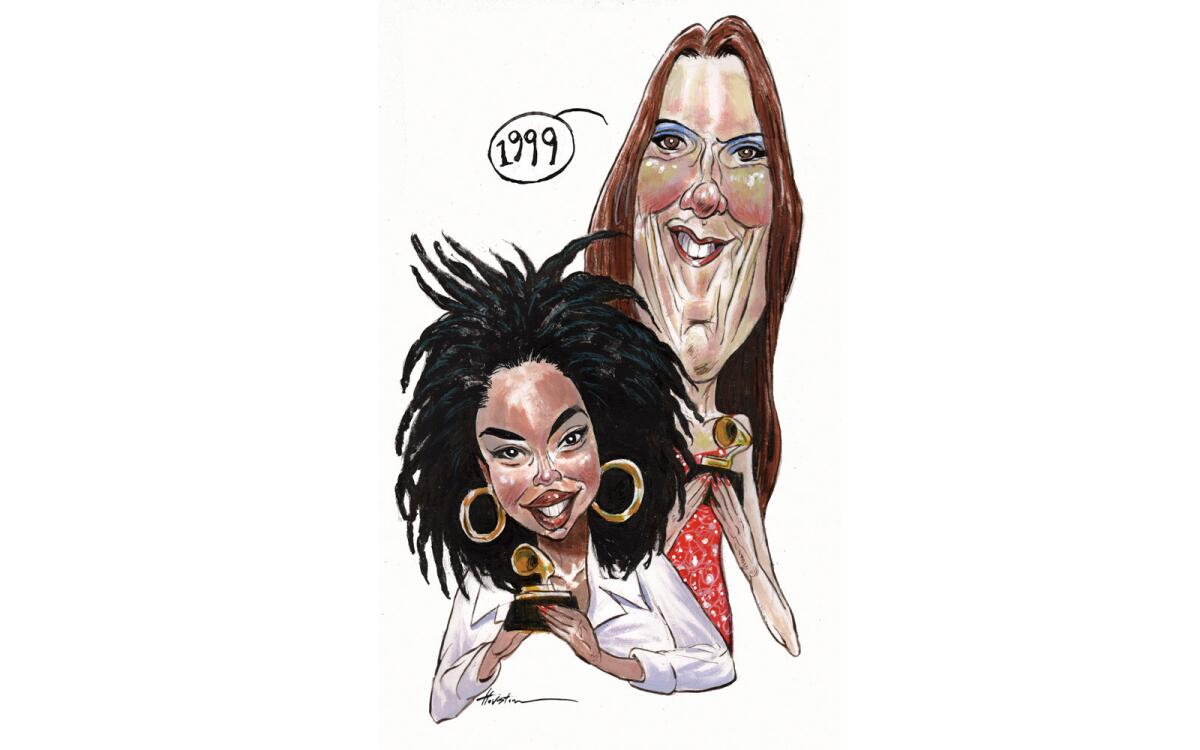
1999
As with ’89, the awards a decade later proved crucial. For the first time, all five album of the year contenders were made by women: Sheryl Crow, Madonna, Lauryn Hill, Shania Twain and Garbage (who is fronted by Shirley Manson).
The yin and yang of the year couldn’t have been more defined in the victors, though: Hill’s innovative, politically aware solo debut “The Miseducation of Lauryn Hill” earned the album of the year trophy, one of Hill’s 10 nominations that year.
Her win propelled the Grammys into a new era: It was the first for a hip-hop-focused album to land the night’s biggest award.
At the other end of the musical spectrum, “My Heart Will Go On,” Celine Dion’s trillion-selling pop ballad from “Titanic,” earned both record and song of the year.
A decade after hip-hop’s inclusion, voters had a better grasp of the field, nominating rappers including Jay Z (“Hard Knock Life”), Outkast (“Rosa Parks”) and A Tribe Called Quest (for its album “The Love Movement”).
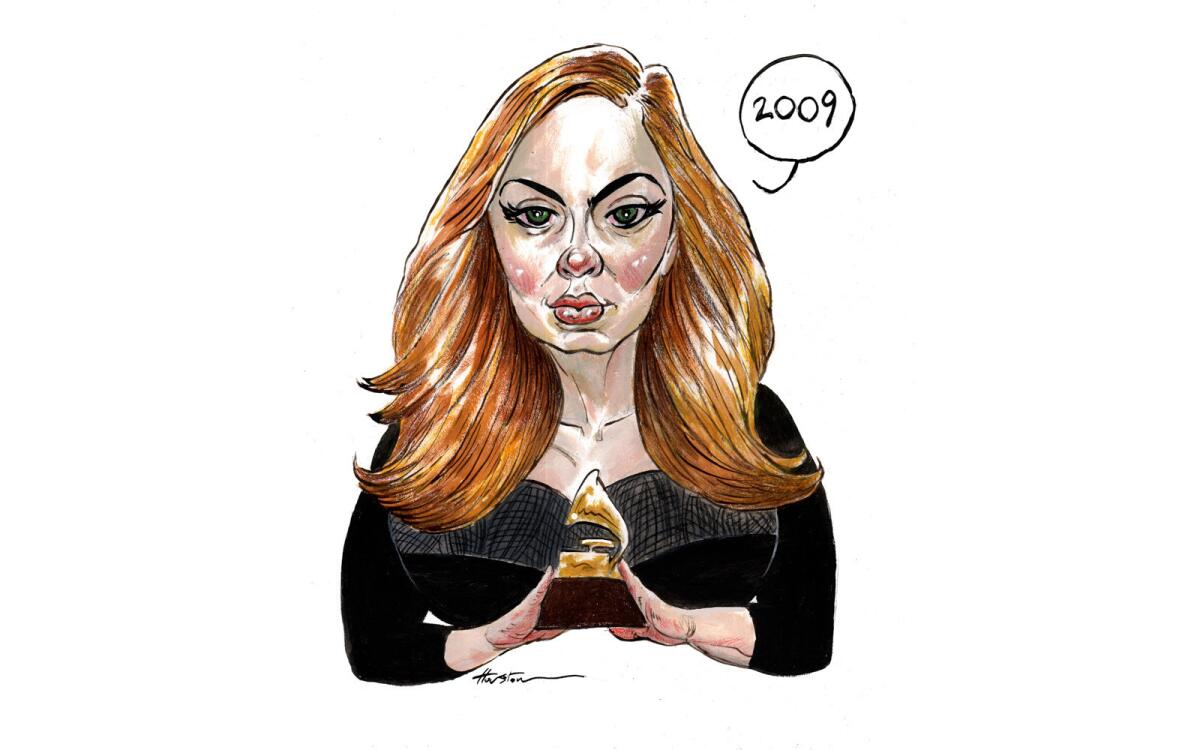
2009
At a ceremony that might more pleasantly be remembered for breakout nods to Adele, Coldplay, and Robert Plant and Alison Krauss’ album-of-the-year “Raising Sand,” an off-site incident — or, rather, assault — will be forever linked to the 51st event.
As the festivities were commencing at Staples Center, reports emerged that rising R&B star Chris Brown had been arrested on the way to the ceremony for attacking his date, then-girlfriend Rihanna.
The news spread via texts and social media in real time, casting a pall over the Grammys. Few recall, for example, that leading nominee that year was Lil Wayne, whose “Tha Carter III” had made him a household name.
The Jonas Brothers were young and scream-worthy, which earned them a best new artist nomination alongside British singer Duffy, country trio Lady Antebellum and R&B singer Jazmine Sullivan. But they would be outpaced by Adele, whose “Chasing Pavements” had become her first smash hit. What a difference a decade makes.
For tips, records, snapshots and stories on Los Angeles music culture, follow Randall Roberts on Twitter and Instagram: @liledit. Email: randall.roberts@latimes.com.
More to Read
The biggest entertainment stories
Get our big stories about Hollywood, film, television, music, arts, culture and more right in your inbox as soon as they publish.
You may occasionally receive promotional content from the Los Angeles Times.











